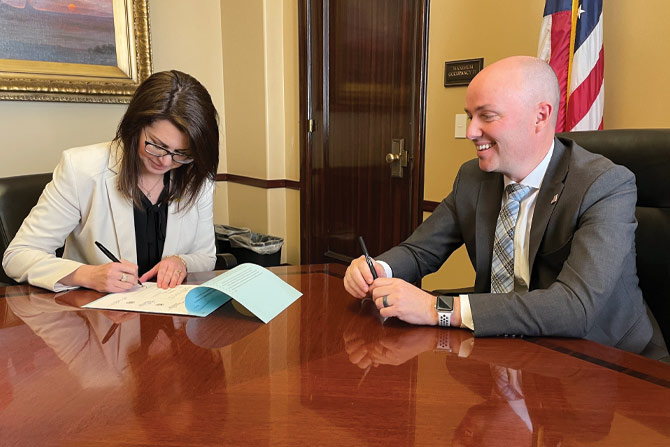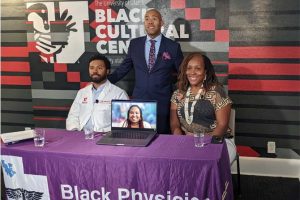Pictured above: Utah Governor Spencer Cox and Lieutenant Governor Deidre Henderson sign the Concurrent Resolution Honoring the Work of Primary Care Providers to the Citizens of Utah into law.
The annual Utah Legislative Session can often feel a bit like the directions on a bottle of shampoo — lather, rinse, repeat. Similar bills, same legislators, same arguments in favor or opposed, etc.
However, this year, we took some very proactive steps and ran two pieces of our own legislation.
Our Primary Care Spend bill, HB210, is a fairly innocuous data bill but one that can provide a great deal of important information that will inform future legislation and healthcare work. Nationally, there has been an effort to draw attention to the low amount of healthcare dollars spent on primary care and to find ways, both legislatively and administratively, to increase that spending. We talked about Primary Care spending at length in our fall magazine, and it is no great secret that when we spend more on primary and preventative care, we spend less, over time, on emergency care and on illness and disease that has gone untreated. With year-over-year data showing the amount we spend, we will be able to track initiatives aimed at increasing prevention and well-care — key components to driving down healthcare costs. We will be watching this data closely and proposing ways to increase primary care spending.
Our second bill is what we refer to in the political sphere as a “warm fuzzy.” HCR 11 Concurrent Resolution Honoring the Work of Primary Care Providers to the Citizens of Utah highlights the hard work and dedication of all our primary care providers and shows the legislature’s support and gratitude for their work. While bills like this don’t change any laws, they do help create a culture of understanding and appreciation for family physicians that helps as we move forward with future legislation. Continual focus on the hard work of family physicians and all primary care providers ensures that legislators and administrators recognize the critical need for increased funding, awareness, residency positions, etc., all areas on which we continue to work.
As expected, there were a lot of COVID- and vaccine-related bills. We tracked these closely. While we support individual freedom, we are also very focused on public health and the need for doctors, hospitals, clinics, etc., to have the ability to enact and enforce their own policies with regard to the safety and well-being of both patients and staff. For bills such as HB63 and SB194, we worked hard to ensure that exemptions were included in the bill language to allow you to make these decisions for yourself and your staff as you see best.
We were instrumental in passing a bill to protect healthcare workers. Unfortunately, we’ve seen an uptick in aggressive behavior from patients who are frustrated and unwilling to follow the rules of a clinic. We’ve heard stories of things thrown at staff, doctors and nurses pushed, punched, and otherwise assaulted. This new bill, HB32, creates an enhanced penalty for such offenses, and we encourage clinics to post signs highlighting the penalties for any assault. Physicians and support staff should never fear for their safety when providing care and compassion for a patient.
One last bill worth mentioning is HB80, a Diabetes Prevention Program that will provide a nationally recognized educational program for Medicaid patients who present as pre-diabetic or at high risk for acquiring diabetes. It took two years to pass, but with a lot of extra effort by other collaborative groups and us, it passed this year. This program will save money, and it will save lives. As we all know, diabetes is growing exponentially, but with early detection and education about lifestyle options, we hope to see that trend lessen and people get earlier help to combat this disease.
Our work during the session would be far less successful without the input from our Legislative Advocacy Committee members. All members are welcome to participate in this annual committee, and we love getting feedback and insight into issues that are of importance to you.







